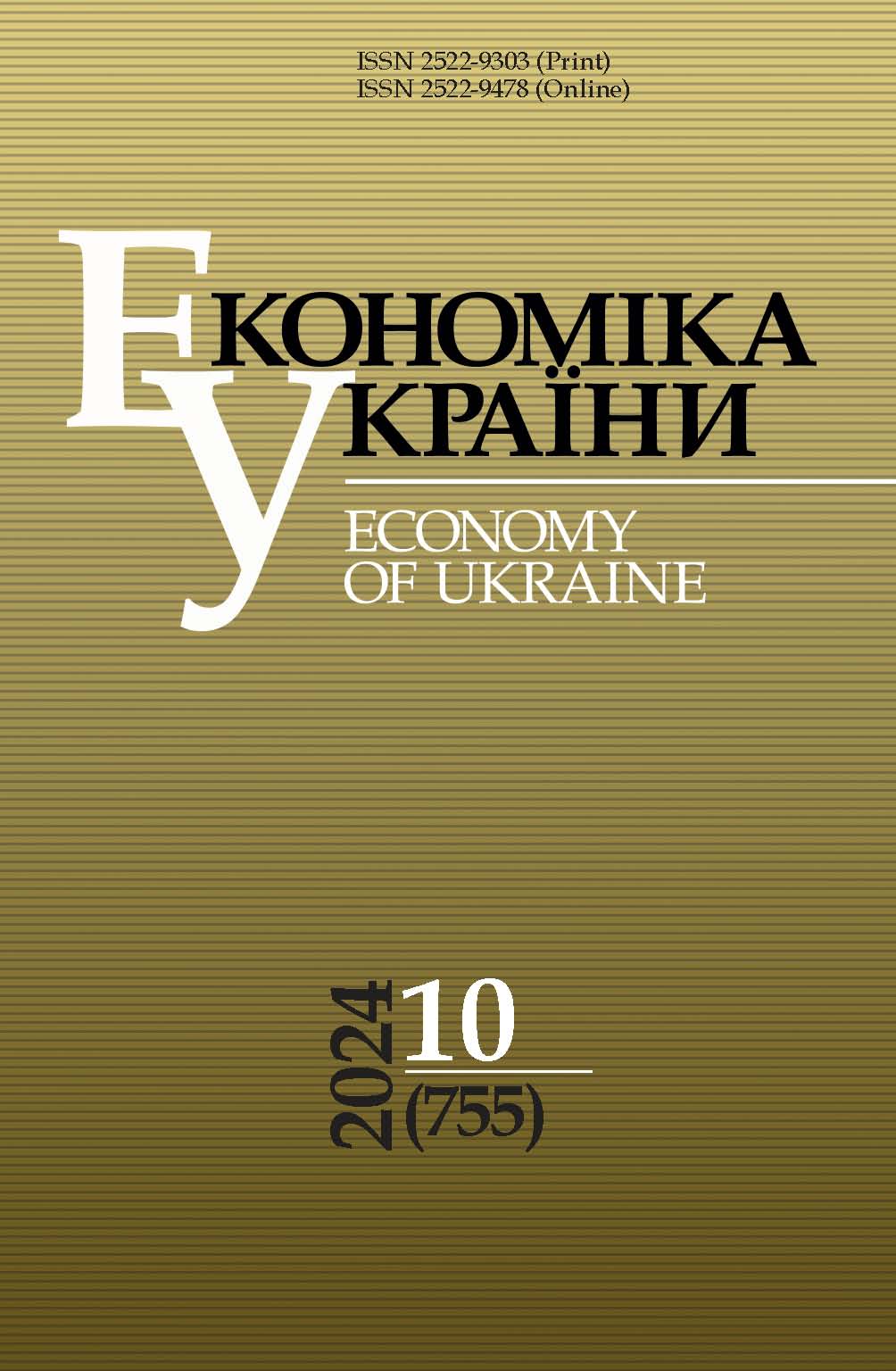TOWARD THEORETICAL UNDERSTANDING OF SMART ECONOMY
DOI:
https://doi.org/10.15407/economyukr.2024.10.092Keywords:
smart economy; level of understanding; smart society; co-revolution; intellectual revolution; functional intelligent machine and its types; human-machine intelligent system; smart economy of I; II; III, and IV type; integral smart economy; set of human-machine intelligent systemsAbstract
The levels of understanding smart economy as a reality are considered — empirical, abstract-theoretical, theoretical-applied. Within the empirical level, an acronym SMART, the views on knowledge economy, on smart economy as a part of smart society and a new model of economy based on information, innovation, protection of population and environment, as well as on its composition, functional dimension, target causality, certain applied aspects are characterized.
It is recognized that the main content of the modern knowledge-information-digital or intellectual revolution is the transfer of the functions of intellectual (in a broad sense) essential human forces to a special machine, as well as the creation of the essential forces necessary for this. The stages of this revolution are distinguished: mechanical, electronic-digital, neural, quantum. At the abstract-theoretical level, the initial, basic object, the essential core of the smart economy is defined as the human-machine intelligent system being the unity of a human actor and a human-controlled functional intelligent machine, with a decisive role of human as the main productive force behind knowledge-information or intellectual products, which in market conditions acquire specific forms of intellectual property objects and, usually, become goods. At the general-specific level of understanding, the smart economy as a whole or in a broad sense represents the unity of core (initial object) and interconnected therewith and adequate thereto components of I, II, III, and IV type, which function in almost all areas and types of economic activity in a broad sense. "Type I smart economy" is represented by the full production cycle of human-machine intelligent systems; "type II smart economy " — by a full cycle of producing knowledge-information products by means of such systems; "type III smart economy" — by the use of human-machine intelligent systems in various areas and types of activity for the full production cycle of various products; "type IV smart economy" — by a synergistic effect of the interaction between the core of the smart economy and its three types. In view of the above, the prospects open up for applied research into specific forms and types of smart economic activity, the content of the interrelationships between smart economy and other components of the economy as a social production, smart economy’s socio-economic, organizational-economic, and institutional dimensions.
References
Doran, G. (1981). There's a S.M.A.R.T. way to write management's goals and objectives. Management Review. Vol. 70. No. 11. P. 35-36. URL: https://community.mis.temple.edu/mis0855002fall2015/files/2015/10/S.M.A.R.T-Way-Management-Review.pdf
Brych, V., Putsenteilo, P., Kostetskyi, Ya., Hunko, S. (2022). Smart specialization as a driver of the innovative regional development system. Innovative economy. 1(90). 141-151. https://doi.org/10.37332/2309-1533.2022.1.19 [in Ukrainian].
Tarasevich, V. (2017). Fundamental economic science: the universeness of content and development. Dnepr. 1022 p. [in Russian].
Forey, D. (2004). Economics of Knowledge. The MIT Press. 129 p. URL: https://books.google.com.ua/books?id=aEMHzEUJQZQC&printsec=frontcover&hl=ru#v=onepage&q&f=false
Levy, Ch., Wong, D. (2014). Towards a smart society. Lancaster, Big Innovation Centre. 31 p. URL: https://biginnovationcentre.com/wp-content/uploads/2023/05/BIC_TOWARDS-A-SMART-SOCIETY_03.06.2014.pdf
Urikova, O., Vorobiy, Kh., Kosyk, V. (2022). Smart economy and its development prospects. Scientific Perspectives. 11(29). 267-278. https://doi.org/10.52058/2708-7530-2022-11(29)-267-278 [in Ukrainian].
Severyn-Mrachkovska, L. (2021). The concept of smart economy in economic and philosophical discourse. In: Interdisciplinary discourse in studying the phenomenon of the social. Kyiv. 258 p. P. 87-96. URL: https://ir.kneu.edu.ua/items/b53a5bf9-d8ae-49e0-9f29-8c952f4ab9b5 [in Ukrainian].
Kalenyuk, I., Uninets, I. (2021). Smart economy ecosystem in a global environment. Strategy of economic development of Ukraine. 49. 5-16. https://doi.org/10.33111/sedu.2021.49.005.020 [in Ukrainian].
Bruneckiene, J. (2014). The concept of smart economy under the context of creation the economic value in the city. Public Policy and Administration. 13(3). 469-482. https://doi.org/10.5755/j01.ppaa.13.3.8301
Yehorov, I. (Ed.) (2020). The formation of "smart specialization" in the economy of Ukraine. Kyiv. 278 p. URL: http://ief.org.ua/docs/mg/331.pdf [in Ukrainian].
Vyshnevskyi, O., Raboshuk, S., Lisovets, I., Honcharenko, M. (2023). Directions for improving smart-specialization strategy of the regions of Ukraine from the positions of schumpertianity, institutionalism, and developmentalism. Economy of Industry. 1(101). 40-50. http://doi.org/10.15407/econindustry2023.01.040 [in Ukrainian].
Vyshnevskyi, O. (2022). Smart Specializations from the Standpoint of Leading Schools of Economic Theory. Herald of the Economic Sciences of Ukraine. 1(42). 3-8. https://doi.org/10.37405/1729-7206.2022.1(42).3-8 [in Ukrainian].
Vyshnevskyi, V., Knyazev, S. (2017). Smart industry: prospects and challenges. Economy of Ukraine. 60. 7(668). 22-37. URL: http://economyukr.org.ua/?page_id=723&lang=uk&aid=210 [in Ukrainian].
Kolot, A. (2024). Ecosystemism as an imperative for resilient human-dimension development. Kyiv. 52 p. [in Ukrainian].
Tarasevych, V. (2021). Modern co-revolution: activity content and dialectics of informative and cognitive systems. Economy of Ukraine. 64. 10 (719). 3-18. https://doi.org/10.15407/economyukr.2021.10.003 [in Ukrainian].
Tarasevych, V. (2022). Modern co-revolution: a mechanized man and/or a humanized machine. Economy of Ukraine. 65. 2 (723). 20-36. https://doi.org/10.15407/economyukr.2022.02.020 [in Ukrainian].
Tarasevych, V. (2023). Knowledge-information noumena and phenomena in the economy. Dnipro. 224 p. [in Ukrainian].
Downloads
Published
How to Cite
Issue
Section
License
Copyright (c) 2024 Publisher PH "Academperiodyka" of the NAS of Ukraine

This work is licensed under a Creative Commons Attribution-NonCommercial-NoDerivatives 4.0 International License.



